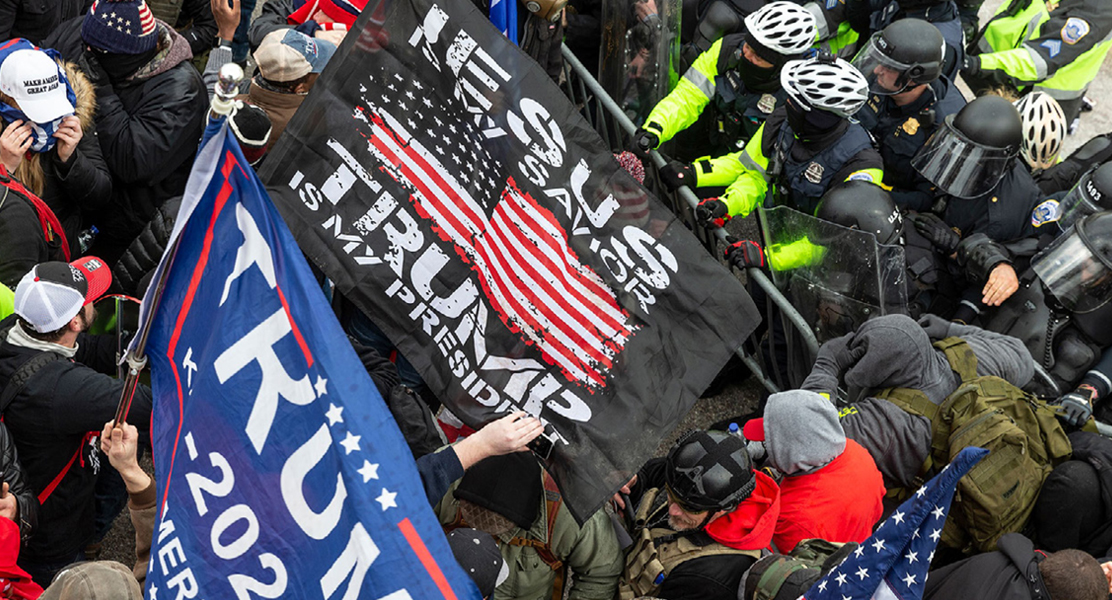New report details significant role of Christian nationalism in January 6 attack on the Capitol

A remarkable and essential new report issued jointly by BJC and the Freedom From Religion Foundation (FFRF) provides a comprehensive look at the way Christian nationalism motivated and permeated the January 6, 2021, insurrection by documenting and examining the imagery, prayers, and other statements of the rioters and riot organizers. As New Yorker journalist Luke Mogelson – who was in the Capitol building that day – said to Andrew Seidel, one of the report authors, “[t]he Christianity was one of the surprises to me in covering this stuff, and it has been hugely underestimated… That Christian nationalism you talk about is the driving force and also the unifying force of these disparate players…”
The document, titled “Christian Nationalism and the January 6 Insurrection,” provides detailed and documented evidence of the extent of Christian nationalism throughout multiple elements of the attack on January 6, including the pervasive symbols, signs and iconography in the crowd:
The imagery and violence of January 6 left indelible stamps on the American memory. Of the thousands of photos and videos taken that day, several moments have come to symbolize the insurrection. The five categories of iconic imagery examined here [the gallows; the cross; flags; signs, clothing and Bible verses; and white Jesus and religious iconography] all have ties to Christian nationalism. The officers on duty that day described seeing the Christian nationalism, even if they didn’t know what to call it. D.C. Metropolitan Police Officer Daniel Hodges testified to a House Select Committee, “It was clear the terrorists perceived themselves to be Christians,”
The report also emphasizes that Christian nationalism was on display not only on January 6 but also in the days and weeks leading up to the attack, intensifying and unifying those who believe the false claim that President Joe Biden did not win the 2020 presidential election, starting as far back as Election Day:
Almost immediately after the polls closed on Election Day, [Christian nationalist political] machinery changed gears to stoke outrage and fear, exhort action, and work to give Trump a second term as president, no matter what the voters wanted. Paula White, still involved with the White House at the time …began hosting nightly prayers… “White and fellow prayer warriors called on God to smite the president’s enemies—his political opponents, anyone standing in the way of a second term, and anyone interfering with their vision of national and global dominion,” explained one observer. On the second night of prayer, White preached that “God, we declare that you will keep the POTUS [sic] in his purpose and in his position,” and, “We override the will of man for the will of God, right now.”
Providing important context, the report also helpfully provides background information discussing the recent rise of Christian nationalism and its close connection to white supremacy, as well as the response of many Christian leaders in opposing Christian nationalism and the attack on the Capitol. As BJC Executive Director Amanda Tyler explains, the insurrectionists were no friend to Christianity:
The rioters, who can accurately be labeled as radical Christian terrorists, used Christianity as a kind of mascot, trying to lend credibility and social acceptability to their terrorism. In the process, they sullied Christianity and Jesus in the hearts and minds of people all over the world.
The report features contributions from a wide range of historians, scholars, advocates, and experts, including Tyler; Andrew Seidel, a constitutional attorney at the Freedom From Religion Foundation and author of The Founding Myth: Why Christian Nationalism Is Un-American; researchers Dr. Andrew Whitehead and Dr. Samuel Perry (who are the co-authors of Taking America Back For God: Christian Nationalism in the United States); Dr. Anthea Butler, the Geraldine R. Segal Professor of American Social Thought at the University of Pennsylvania; Katherine Stewart, author of The Power Worshippers: Inside the Dangerous Rise of Religious Nationalism; and Dr. Jemar Tisby, a historian of race and religion and author of The Color of Compromise: The Truth about the American Church’s Complicity in Racism.
Take the time to read through this report — there are important elements covered in this comprehensive report that go deep into history, research, the impact and overlap of white supremacy and Christian nationalism, an exploration of the networks of power at play, and much more.
For example, Dr. Tisby explores different ways Black Christian communities fuse faith and political action:
In contrast to white Christian nationalism, Black Christians have historically tended to embrace a kind of patriotism that leads to an expansion of democratic processes, the inclusion of marginalized people, and a call for the nation to live up to its foundational ideals. … The historic example of Black Christians demonstrates that a Christian commitment to God and country does not always mean making America a white man’s country.
Many of the contributors participated in a webinar on February 9 releasing the report – you can watch a recording of that here.
You can read the entire report here. And, if you are a Christian concerned about the rise of Christian nationalism, join more than 24,000 other Christians in signing this statement of unifying principles (launched in 2019), and check out the resources for information you can share on social media and curriculum you can use for small group discussions to help root out this ideology in your community.
As Amanda Tyler wrote in the report, “The Christian response to Christian nationalism must not only be widespread to be effective; it also must be prolonged. The ideology of Christian nationalism, which has become deeply entrenched in American society over centuries, will take generations to dismantle.”
It will take all of us.




